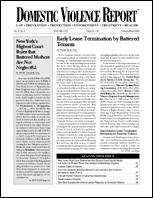Supreme Court’s “True Threats” Analysis Increases Risk of Violence Against Women
Author: Anne L. Perry.
Source: Volume 29, Number 01, October/November 2023 , pp.15-16(2)

< previous article |next article > |return to table of contents
Abstract:
This article analyzes the landmark stalking case of Counterman v. Colorado, 143 S. Ct. 2106, decided by the U.S. Supreme Court in June 2023. The Court reversed the stalking conviction of a Colorado man who was sentenced to 4-1/2 years in prison based on his unwanted online messages, many of them menacing. Counterman challenged his stalking conviction, arguing that his messages were not “true threats” and that the First Amendment required the State to show that he was aware of the threatening nature of his statements. The Supreme Court agreed that the State courts had applied the wrong test and pronounced that the State must prove that Counterman had a subjective understanding of the threatening nature of his communication or had “disregarded a substantial risk that his communications would be viewed as threatening violence.” In reversing the defendant’s conviction, the Court presented an analysis of the First Amendment’s “true threats” doctrine. The Court’s application and analysis thereby increased the risk of violence to women.Keywords: Counterman v. Colorado; “True Threats” First Amendment Analysis
Affiliations:
1: Contributing Editor.